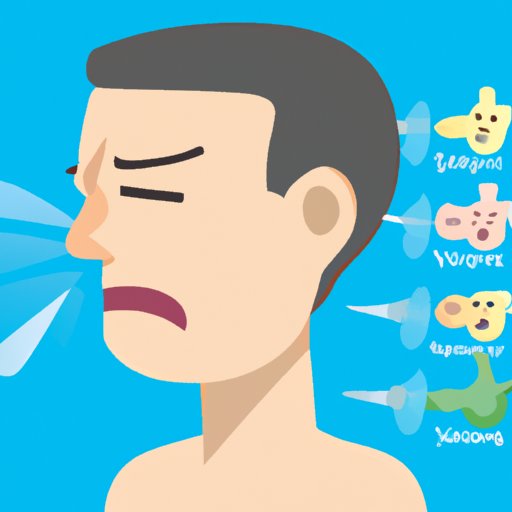Introduction
A stuffy nose is a common symptom of colds, allergies, and other conditions. It can be uncomfortable, inconvenient, and even painful. Fortunately, there are a few things you can do to help relieve your stuffy nose.
A stuffy nose occurs when the tissues and blood vessels inside your nose become swollen due to inflammation. The swelling blocks airflow through your nose, leading to congestion and a feeling of pressure. Common causes of a stuffy nose include sinus infections, colds, allergies, and changes in air pressure. Symptoms of a stuffy nose include difficulty breathing, decreased sense of smell or taste, and postnasal drip.

Take a Hot Shower or Steamy Bath
Taking a hot shower or steamy bath can help relieve your stuffy nose. The heat and steam from the water will help open up your nasal passages, allowing you to breathe easier. This is because the heat helps to reduce inflammation in your nasal passages.
To take a hot shower or steamy bath, start by running the hottest water you can tolerate in the shower or bathtub. Then, step into the shower or tub and allow the hot water to run over your face and body. You can also add essential oils, such as eucalyptus or peppermint, to the water to further open up your nasal passages. Stay in the shower or bath for 10-15 minutes, then step out and dry off.
Use a Saline Spray or Nasal Irrigation
Using a saline spray or nasal irrigation can also help relieve your stuffy nose. Saline sprays contain a mixture of salt and water that helps to loosen mucus and reduce inflammation. Nasal irrigation involves using a bulb syringe or neti pot to flush out your nasal passages with a saline solution.
To use a saline spray, simply spray the solution into each nostril. To use nasal irrigation, fill a bulb syringe or neti pot with a saline solution and tilt your head to one side. Gently insert the tip of the syringe or pot into the top nostril and slowly squeeze the solution into your nasal passage. Allow the solution to flow out of the bottom nostril. Repeat on the other side.
Drink Plenty of Fluids
Drinking plenty of fluids can also help relieve your stuffy nose. When you’re dehydrated, your mucus becomes thicker and harder to clear from your nasal passages. Drinking plenty of fluids helps to thin out the mucus, making it easier to clear from your nose.
It’s important to drink plenty of water throughout the day, especially when you’re dealing with a stuffy nose. You can also drink herbal teas, such as chamomile or ginger, to help soothe your throat and reduce inflammation. Avoid caffeinated beverages, as they can make dehydration worse.

Elevate Your Head While Sleeping
Elevating your head while sleeping can also help relieve your stuffy nose. When your head is elevated, gravity helps to keep your nasal passages open, allowing air to flow more freely. This can help reduce congestion and improve your breathing.
To elevate your head while sleeping, try using an extra pillow beneath your head and neck. You can also prop your bed up on blocks or bricks to elevate the whole bed. Make sure your head is at least 6 inches higher than the rest of your body.
Avoid Allergens and Irritants
If you’re dealing with allergies or other environmental factors, avoiding allergens and irritants can help relieve your stuffy nose. Common allergens and irritants include dust, pet dander, smoke, strong fragrances, and pollen. If possible, try to avoid these triggers or limit your exposure to them.
You can also invest in an air purifier to help reduce allergens and irritants in your home. Vacuum and dust regularly, and consider replacing carpeting with hardwood or tile flooring. Keep windows closed during high pollen seasons, and wear a mask when necessary.
Use Over-the-Counter Decongestants
Over-the-counter decongestants can also help relieve your stuffy nose. These medications work by constricting the blood vessels in your nasal passages, reducing inflammation and improving airflow. Popular options include pseudoephedrine, phenylephrine, and oxymetazoline.
When using over-the-counter decongestants, follow the instructions on the label carefully. Do not exceed the recommended dosage, as this could cause adverse side effects. If you’re pregnant or nursing, talk to your doctor before using any decongestant medications.
Conclusion
A stuffy nose can be uncomfortable and inconvenient. Fortunately, there are a few things you can do to help relieve your stuffy nose, such as taking a hot shower or steamy bath, using a saline spray or nasal irrigation, and drinking plenty of fluids. You should also try to avoid allergens and irritants, and consider using over-the-counter decongestants if necessary.
If your symptoms persist or worsen, contact your doctor. They can help determine the underlying cause of your stuffy nose and provide additional treatment recommendations.
(Note: Is this article not meeting your expectations? Do you have knowledge or insights to share? Unlock new opportunities and expand your reach by joining our authors team. Click Registration to join us and share your expertise with our readers.)
